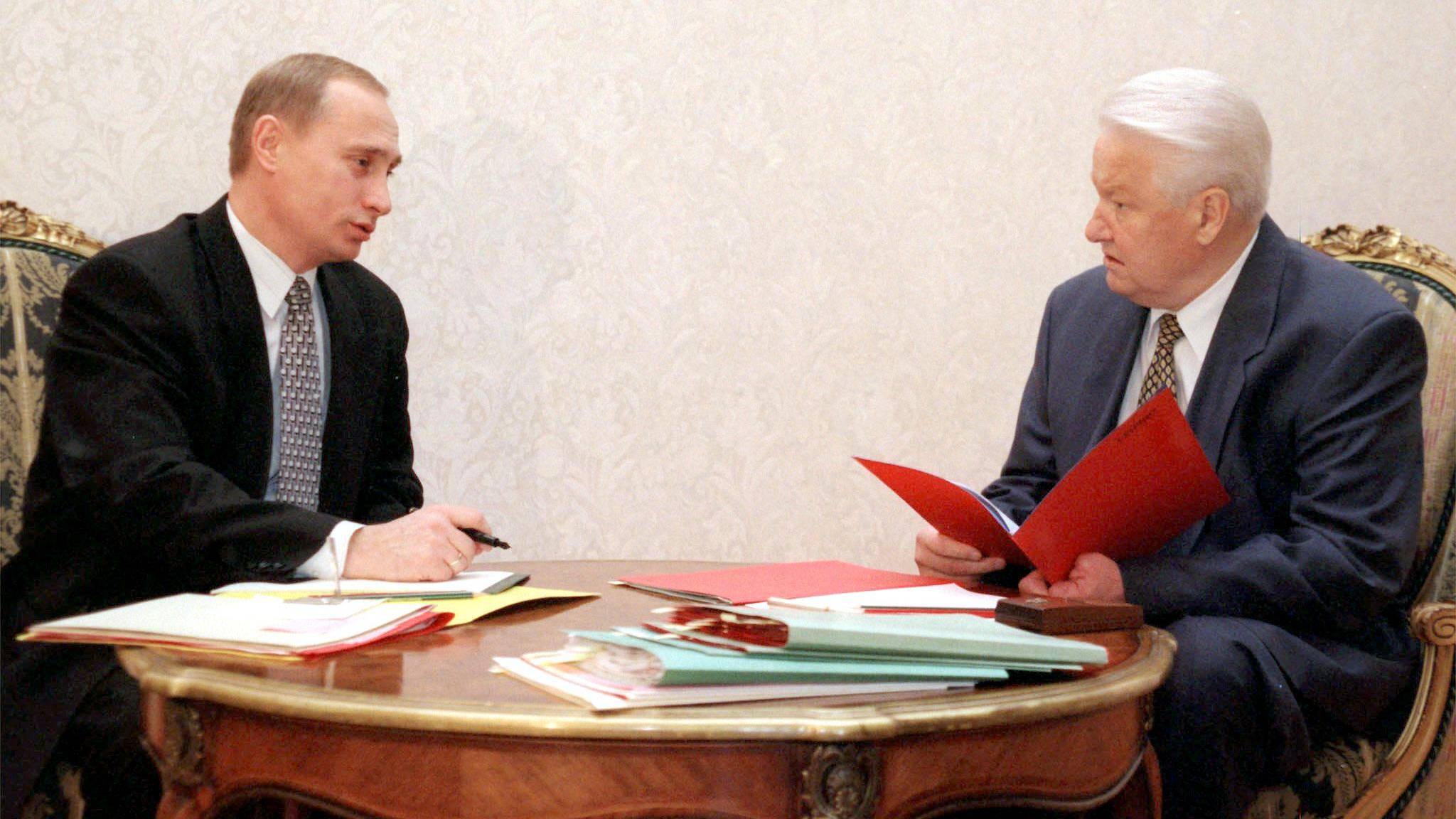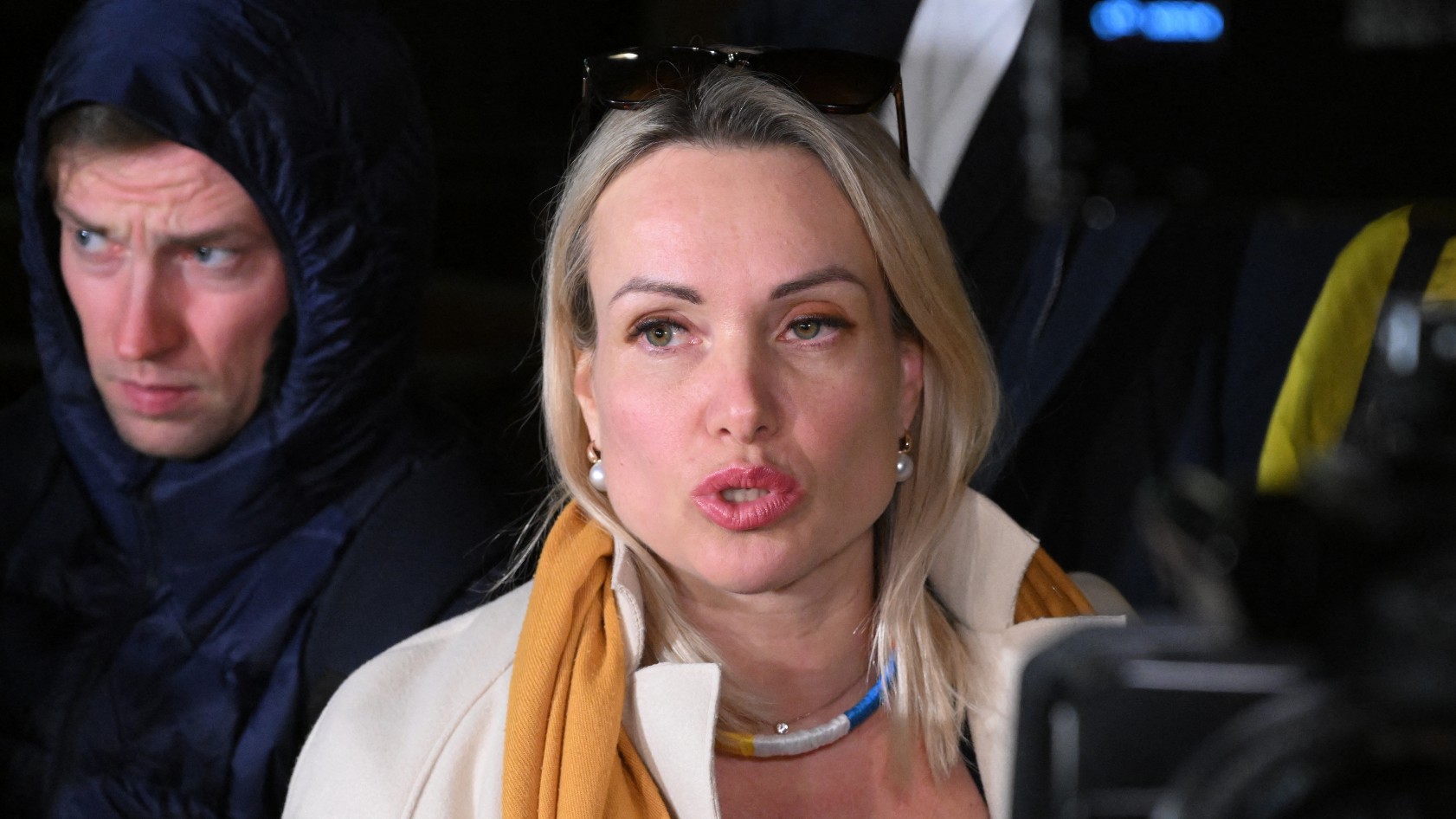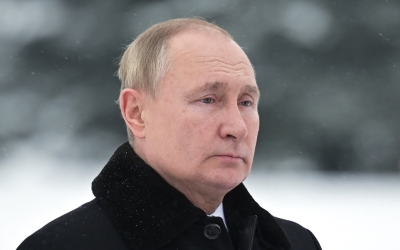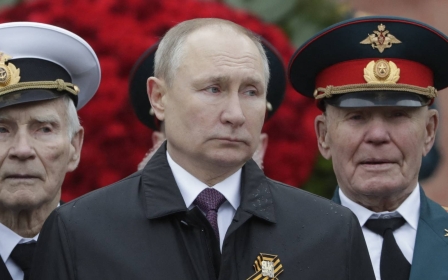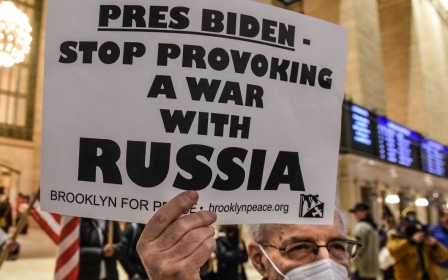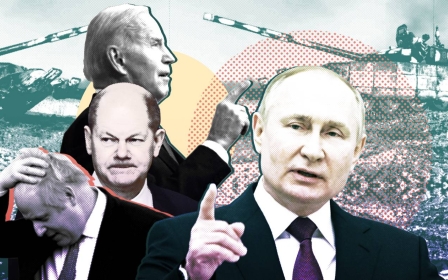Russia-Ukraine: How Putin's 'military operation' became a battle for the soul of Russia
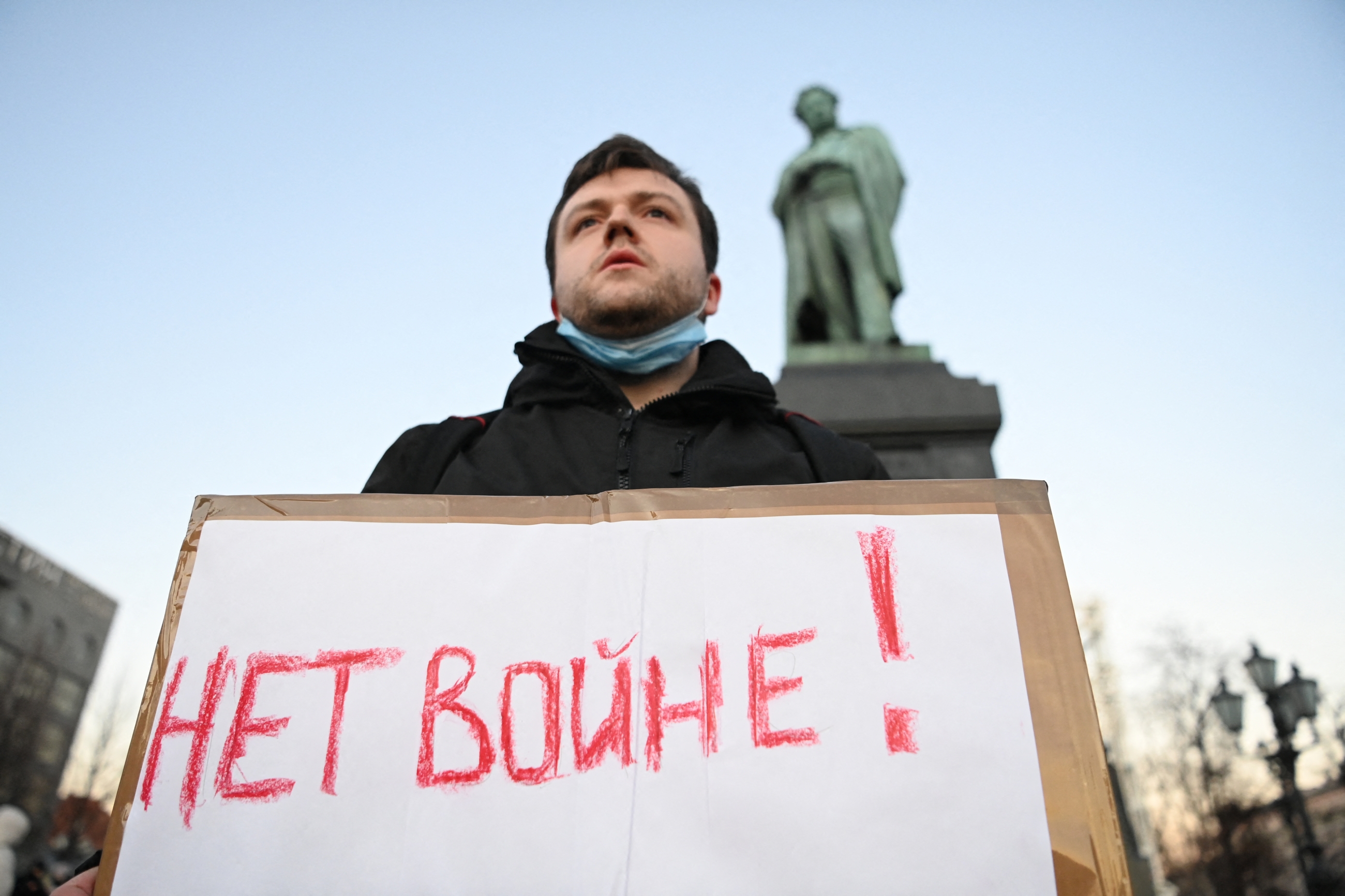
It is November 1992. The place is Tishinsky market in Moscow. Snow is falling on a bedraggled line of traders hawking anything that will sell. Even spent light bulbs have their value in this market.
Western economists were treating Russia like a monetarist laboratory
We approach one of the sellers. He turns out to be a former professor of physics. Another is an Olympic swimming coach. Each tells the same story. One minute they had a position and savings, the next they had none. This was not regime change. It was revolution.
Yegor Gaidar, the prime minister at the time, has a month to go before President Boris Yeltsin replaces him, but the damage is done. Hyperinflation is roaring as a result of his shock therapy reforms, a formula first tried out in Pinochet’s Chile.
Here in Tishinsky, there is more shock than therapy. But western economists are in a state of rapture. They are treating Russia like a monetarist laboratory - how, in this case, to create a hard rouble out of the complete collapse of the economy.
The loss of industrial output in the first five years of democracy in the Russian Federation was greater than during Hitler’s invasion in 1941. Between 1991 and 1996, the collapse of the Russian economy was greater than that of the Depression in the US.
New MEE newsletter: Jerusalem Dispatch
Sign up to get the latest insights and analysis on Israel-Palestine, alongside Turkey Unpacked and other MEE newsletters
But the West was cheerleading the collapse of Russia, not least the leading "transition economists" like Jeffrey Sachs. The western media were salivating too in a Moscow that had embraced neoliberalism with such vigour. Yeltsin turned up to inaugurate the second McDonald's to open in Russia. Opposite him is a statue of Pushkin.
My Russian friend is one of the few present to be in deep gloom. "There will be a reply to this. And you in the West won’t like it," he told me.
The rise of Vladimir Putin
In Moscow few - at the time - were aware of Vladimir Putin. Yeltsin and his western advisers were looking in the wrong direction for early signs of their nemesis. They feared a resurgence of "red directors" of the old state monopolies and the Communist Party, so they framed the 1993 election as a fight between the Whites and Reds - a conscious attempt to terrorise Russian voters with memories of the civil war.
Putin’s emergence from the bowels of the corrupt circle around Yeltsin, known as The Family, showed that Russia’s brief alliance with the West held the seeds of its own destruction
They paid no attention to people that Yeltsin himself was promoting. Putin’s emergence from the bowels of the corrupt circle around Yeltsin, known as The Family, showed that Russia’s brief alliance with the West held the seeds of its own destruction.
But, at that time, an elaborate network of foreign shell companies was created to hide the money stolen by the Family and the wider circle of oligarchs. This all happened with the full knowledge and consent of British governments and their secret service.
This is why it is nothing less than stand-up comedy to hear Michael Gove, British secretary of state for levelling up, professing shock at the scale of Russian influence in London. Has he asked the Tory party chairman, Ben Elliot, about his connections with Russian oligarchs, or for that matter Dominic Cummings about his time in Russia and more particularly his friends?
The pioneer and doyen of hiding money stolen from the Russian state was Boris Berezovsky, a mathematician turned used car importer turned oligarch turned MI6 asset turned London exile. His pupil was Roman Abramovich, with whom he subsequently fell out. Money poured into London, no questions asked.
The reply
Putin’s "reply" to the ignominies the Russians suffered is to create a disaster of his own making. But it's more like a series of disasters. Not just for the thousands of Ukrainian brothers and sisters his forces have killed in the last three weeks, but for Russia too.
His army can kill but not fight. It appears to be no better as a fighting force than it was when it smashed Chechnya up twice in 1994 and 1999. No less than four generals and seven members of the Vityaz Special Purpose Centre of the Dzerzhinsky Division have died charging into the breach of Ukrainian guns.
The casualty figures have been exaggerated by both sides, but if the medium range of Russian military casualties is somewhere near the truth, Russia could have lost more men in three weeks in Ukraine than America lost in 20 years in Afghanistan. If the maximum figure is accurate, that would include US losses in Iraq as well.
Even factoring in the interest of western intelligence services in promoting the narrative that everything is going wrong for Putin, Russia’s famed security services are faltering.
Sergey Beseda, head of the foreign intelligence branch of the Federal Security Service (FSB), has allegedly been placed under house arrest. Beseda was in Kyiv when 100 protesters were shot dead in the Maidan uprising. There is also evidence of the FSB leaking information to the Ukrainians, information which led the early teams of soldiers from Chechnya to their deaths.
Putin is increasingly turning to foreign fighters - Chechens, Syrians - for help in storming Ukrainian cities. None of this is good news for the sort of absolute ruler that Putin fashioned himself to be.
The Ukraine disaster
In the past, Putin has sensed his vulnerability to disaster - the siege of the school in Beslan in 2004, the sinking of the submarine Kursk in 2000, the floods in Krasnodar Krai in 2012, are three that come to mind. When you eviscerate all institutions in Russia as Putin's presidency has done, there is only one person left to blame.
Putin acknowledged this by turning up in person on each occasion to take charge. But a military disaster represents a totally different order of threat to a president who has fashioned himself as the strongest of strong men.
When you eviscerate all institutions in Russia as Putin's presidency has done, there is only one person left to blame
Unlike his predecessor, Putin was sober. A Russia that had only just come to terms with the vocabulary of international aviation, said of Putin that he "had his seat back in the upright position".
"Siloviki" roughly translates as "hard men" in English. Putin has a group of them around him, but the hardest of hard men is the president himself. This is not just a matter of image and photo-ops. It is very much the style of rule that has run post-Communist Russia.
The project to invade Ukraine was Putin's war, his idea. He owns it. He not only penned a 5000-word essay saying that Ukraine was a Bolshevik invention which does not really exist. He assembled the army to force it back into the arms of Russia. He told allies in advance that it would happen.
Iran’s oil minister was one of them, during a trip made in January, I understand. The invasion was planned months in advance. And Putin was the man who described a country of 44 million citizens as "this anti-Russia created by the West".
If it was not before the last three weeks of bombardment, it is now.
Voices of dissent
Even if the withdrawal of Russian forces from Ukraine leaves Putin with some tangibles - a promise not to join Nato, a recognition of the sovereignty of breakaway parts of Ukraine, and some extra territory in the south - Putin still has to answer to public opinion.
This sounds counter-factual. Russia is self evidently not a democracy. The candidates at elections are carefully vetted to produce the right level of support and opposition; pro-presidential parties are whisked up at a moment’s notice; the Duma is there to outdo in nationalistic fervour the presidency; genuine political opponents are either in prison - Alexei Navalny - or assassinated - Anna Politkovskaya.
Putin is not the Soviet Union resurrected. His Russia has nothing like the ideology, discipline and internal cohesion of Russian communism at its height
But there is such a thing as public opinion in Russia. It's not Saudi Arabia, or the UAE or Egypt, where one tweet will lead to your disappearance or imprisonment. Putin is closer to Turkish President Recep Tayyip Erdogan as a president with absolute powers than he is to Saudi Crown Prince Mohammed bin Salman.
The majority of Russians believe that the West was creating biological weapons in Ukraine that would target ethnic Russians, and that Nato presents a real threat to the sovereignty of the Russian Federation.
According to Survation, 69% of Russians surveyed believe the military's purpose is that of a “Liberator” and just 13% see Russia as the “aggressor". But opinion is more evenly balanced about whether this war is worth the cost. 43% believe that it is, 33% believe it isn't, 24% don't know. .
It is, therefore, significant that some Russians go public with their dissent. And it is noticeable how muted Putin’s army of paid foreign policy analysts have been during this campaign.
It started with an extraordinary piece of reality TV from the Kremlin as Putin humiliated Russian Foreign Intelligence Service Director Sergey Naryshkin at a meeting of the Russian Security Council. It continued with the brave protest of an editor on Russian TV.
A host of other Russian TV and NTV correspondents have resigned. These are not what Putin once ironically referred to as "nashi liberali" (our liberals). They were very much part of the Putin project for the last two decades.
There are others voicing their objection, such as the test pilot Captain Alexander Garnaev. Brandishing the titles of "A Hero of Russia" and "Honoured Test Pilot", he launched a scathing attack on the way Ukrainian cities have been "bombed and crushed with tanks". Resigning a number of positions over the "completely incomprehensible" war, Garnaev said: "Sooner or later society will know the final number of losses [and] will be horrified."
In Novokuznetsk, in western Siberia, the mothers of soldiers sent to Ukraine accused officials of using them as "cannon fodder". When Sergei Tsivilyov, the regional governor, promised the conflict would end soon, one of the mothers shot back at him "When everyone dies?"
These are cracks in the smooth surface of Putin’s authority, and they come from within, just as Yeltsin’s nemesis did.
A coalition fracturing
Pax Putina was very much a coalition: a new middle class could grow, travel and enrich themselves, just as long they did not mess with politics. The vast majority of Russia had basic services, pensions, education systems which were increasingly being privatised.
Western companies could continue to grow their markets in Russia just as long as they invested in the Russian state too. Putin chaired this coalition as the man who guaranteed stability at home and who won Russia respect as a veteran leader abroad.
The western isolation of Russia that is now set to last as long as Putin remains president breaks this coalition, and Russians are increasingly asking themselves whether the results are worth the high price they are being asked to pay.
Their anger works both ways - against Putin and against Brussels. They bristle at not being called European because everything in their language, culture, music, literature begs to be called European.
Putin's Russia is not the Soviet Union resurrected, and this is his problem. His Russia has nothing like the ideology, discipline, and internal cohesion of Russian communism at its height.
Russia can not go back to the isolation say of Yury Andropov’s Soviet Union, and it will struggle to replace western investors with eastern ones. Since Putin took over, a generation of Russians have grown up in a westernised oil-rich state, used to travelling to Turkey, Cyprus, Tunisia, and France two or three times a year, and to furnish their flats from Ikea.
An existential threat
Putin's response to the evident domestic backlash he is getting is to descend into paranoia. In an improvised speech on Wednesday, he lashed out at "fifth columns" and "traitors" whose only goal was the destruction of Russia. He even took aim at Russia's wealthy. "I am not at all judging those who have a villa in Miami or the French Riviera, who cannot do without foie gras, oysters, or so-called gender freedoms.
Will Russia allow itself to slide back into a third grade authoritarianism based solely around the notion that the West is out to get it?
"The problem is absolutely not in this, but, I repeat, in the fact that many of these people, by their very nature, are mentally located precisely there, and not here, not with our people, not with Russia. This is what they think - in their opinion - a sign of belonging to a higher caste, to a higher race. As things go wrong, this is a dangerous inflation of political rhetoric."
He is lashing out at a good chunk of the coalition he himself constructed. He is not just an oligarch himself. He has the power to create them. Just look at his entourage - a former cook who becomes head of the largest Russian mercenary group Wagner, his gymnast lover, a transport minister who becomes minister of defence. Take a bite out of Russia's filthy rich and what do you have left as a state?
The problem for Putin now is where Russia is "mentally located" after Ukraine.
Will Russia allow itself to slide back into third-grade authoritarianism based solely around the notion that the West is out to get it? What Putin initially cast as a military operation to demilitarise Ukraine is now being cast as an existential threat to the Russian nation.
This will not end well for Putin, or for that matter, Russia.
The views expressed in this article belong to the author and do not necessarily reflect the editorial policy of Middle East Eye.
Middle East Eye delivers independent and unrivalled coverage and analysis of the Middle East, North Africa and beyond. To learn more about republishing this content and the associated fees, please fill out this form. More about MEE can be found here.



